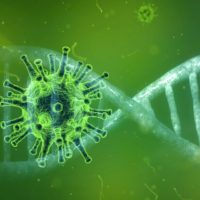Dog Anxiety and Aggression may be Genetic
If you have a dog that is a bit of a scaredy dog or even bares their teeth, this may interest you. New research is making discoveries about how dog anxiety and aggression may be genetic in dogs and now this knowledge might even help with human anxiety.
Dog aggression is a problem
As we know, dog aggression can be a problem to dog owners and to society. What you may not know is that most dog aggression is based on fear. Aggression and anxiety are often linked.
Your dog is scared of an approaching dog and to make this supposed threat back off, they growl, show teeth or lunge, barking at the other dog, who beats a hasty retreat. “No thanks mate. I’m outta here!”
Researchers at the Nationwide Children’s Hospital in Ohio, in the US, looked at the genes associated with aggression in dogs. They discovered that canine genes associated with aggression towards humans in the household were quite different from those associated with aggression towards unknown people and dogs. They found a series of 12 genes that are associated with aggression towards strangers.
What this means for dog owners
Why is this important for dog owners? Well, it means that down the track we, or those who breed dogs, may be able to genetically test for these genes and breed dogs who are not pre-disposed to aggression. That’s good news!
It also lets some of us dog owners, whose dogs are less than friendly towards other people and dogs, off the hook – just a little. Until now, behaviourists, vets and trainers have been telling dog owners that we must socialise our puppies and dogs.
And yes, of course, this is still extremely important in the development of calm, canine behaviour but if your dog has genes for aggression, then any amount of socialisation may never be enough to prevent it from being expressed by your dog.
Dr Jo says “As we understand more about our dog’s aggressive behaviour and their anxiety, we may be able to reduce these unwanted behaviours and even improve our own anxiety…”
And how does this help humans? Well, further research will be looking at the neural pathways of aggression and anxiety and also exploring new therapies which target these biochemical pathways. These may include drug therapies which will ultimately regulate the behavioural effects of these emotions.
Helping humans too
Researchers are currently exploring dogs and it is forecast that if they are effective in dogs, then they can also be applied to humans. Yes, humans with a pre-disposition towards aggressive behaviour may be calmed by understanding dogs. Anxiety and aggression affect us all!
This may be a long way down the track but it is good to know that we are not completely to blame for our dog’s behaviour and that, eventually, perhaps, we will be able to relax a little more when out walking our dogs. Dog Anxiety and Aggression may be Genetic!
If your dog is anxious or aggressive towards unknown people or dogs, or towards family members, it is always worth seeking professional help.
Reference:
- Isain Zapata, James A. Serpell, Carlos E. Alvarez. Genetic mapping of canine fear and aggression. BMC Genomics, 2016; 17 (1) DOI: 1186/s12864-016-2936-3
More pet health articles
- WSAVA Issues Guidance on Pets and the Coronavirus
 WSAVA Issues Guidance on Pets and the Coronavirus Note from Pet Problems Solved: If you are worried about your pets and the coronavirus, please speak to your
WSAVA Issues Guidance on Pets and the Coronavirus Note from Pet Problems Solved: If you are worried about your pets and the coronavirus, please speak to your - Wildlife Risks to Pets to Watch Out For
 WILDLIFE RISKS TO PETS TO WATCH OUT FOR Guest post by Jordan Walker… Is your cat an indoor or outdoor cat? Outdoor cats face risks, from cars,
WILDLIFE RISKS TO PETS TO WATCH OUT FOR Guest post by Jordan Walker… Is your cat an indoor or outdoor cat? Outdoor cats face risks, from cars, - Why Oral Hygiene is Important for your Dog
 How clean is your dog’s mouth? Find Out Why Oral Hygiene is Important for your Dog, thanks to writer Carolette Alcoran who has been researching this topic…
How clean is your dog’s mouth? Find Out Why Oral Hygiene is Important for your Dog, thanks to writer Carolette Alcoran who has been researching this topic… - Why can’t dogs eat chocolate?
 WHY CAN’T DOGS EAT CHOCOLATE? Most of us love chocolate and most of us, pet owner, share titbits of food with our pets. Chocolate however, is the
WHY CAN’T DOGS EAT CHOCOLATE? Most of us love chocolate and most of us, pet owner, share titbits of food with our pets. Chocolate however, is the - What you need to know about insurance for older pets
 WHAT YOU NEED TO KNOW ABOUT INSURANCE FOR OLDER PETS Just like humans, it’s a sad fact of life that as pets grow older, they can develop
WHAT YOU NEED TO KNOW ABOUT INSURANCE FOR OLDER PETS Just like humans, it’s a sad fact of life that as pets grow older, they can develop - What Age Do Dogs Stop Growing?
 I often get asked when puppies stop being puppies. While there is no definitive answer, we generally consider dogs become an adult at around one year of
I often get asked when puppies stop being puppies. While there is no definitive answer, we generally consider dogs become an adult at around one year of - Using Traditional Chinese Medicine with Pets
 Using Traditional Chinese Medicine with Pets If you are looking for harmony and balance between your pets, the environment and health, then you may like to consider
Using Traditional Chinese Medicine with Pets If you are looking for harmony and balance between your pets, the environment and health, then you may like to consider - Toxoplasmosis: More than meets the eye?
 We also have a fantastic infographic on eye infections in dogs (Scroll down) You may have heard of Toxoplasmosis, especially if you are a cat owner and
We also have a fantastic infographic on eye infections in dogs (Scroll down) You may have heard of Toxoplasmosis, especially if you are a cat owner and - Tips To Remember While Opting For Dog Health Supplements
 Tips To Remember While Opting For Dog Health Supplements Ever wondered if your dog needs supplements and what to give them? Layla Flinn from Dog Health Supplements
Tips To Remember While Opting For Dog Health Supplements Ever wondered if your dog needs supplements and what to give them? Layla Flinn from Dog Health Supplements - Tips to help Aging Dogs with Arthritis
 TIPS TO HELP AGING DOGS WITH ARTHRITIS It is a privilege to live with an older pet but this long-lived joy is often combined with coping with
TIPS TO HELP AGING DOGS WITH ARTHRITIS It is a privilege to live with an older pet but this long-lived joy is often combined with coping with
















I think a lot of people have already associated that there are specific dog genes and breeds that are more prone to aggression. And yes, seeking professional help is still the best when you suspect your dogs’ behavior are off.